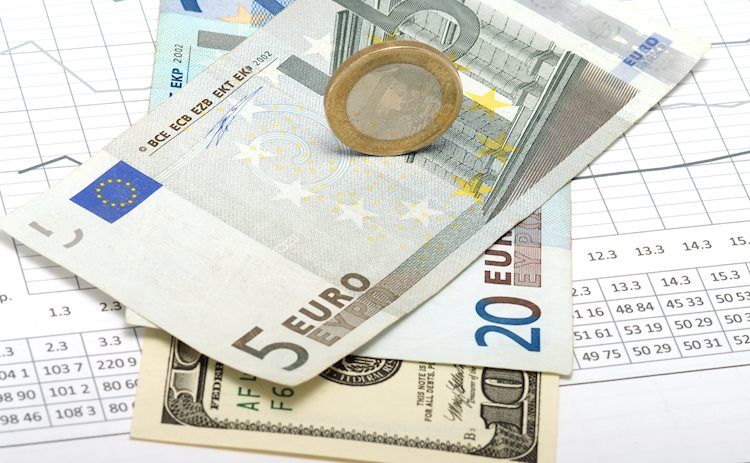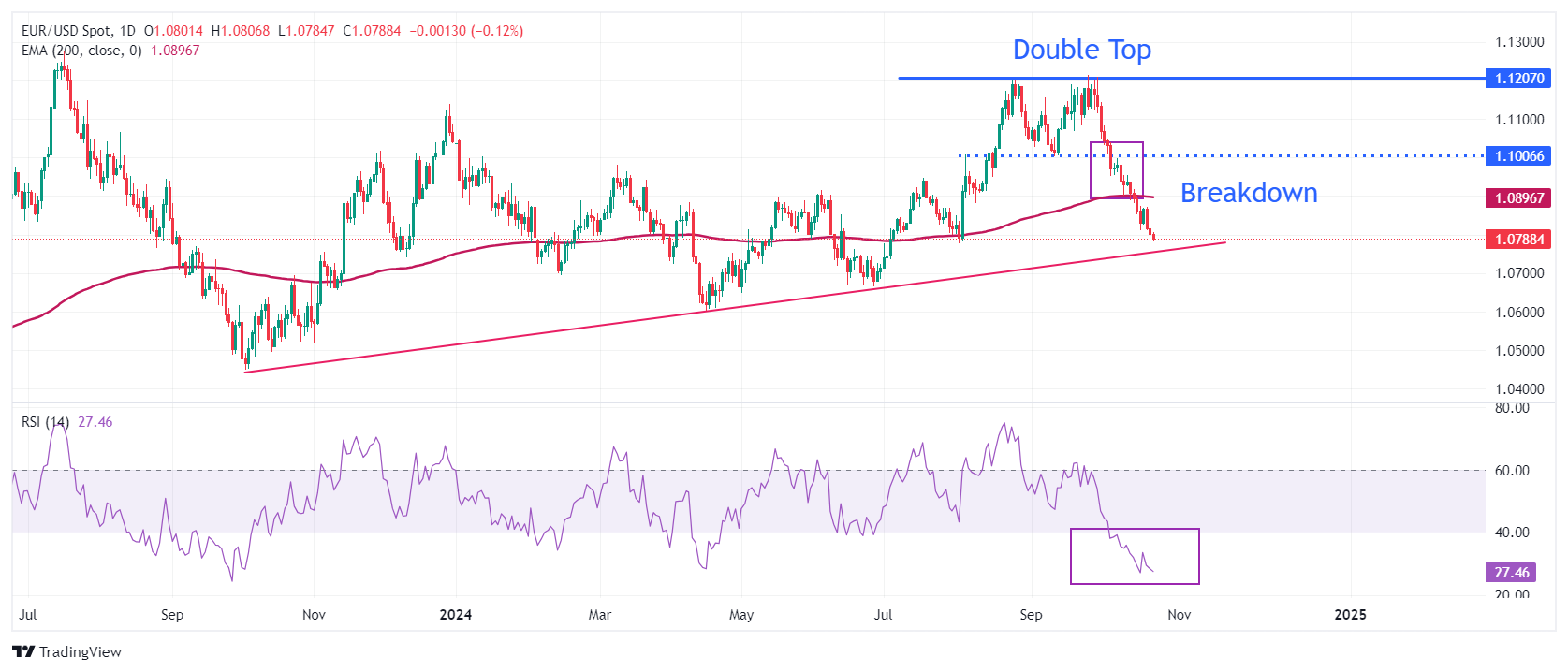- EUR/USD falls further as several ECB policymakers said they expect the Deposit Facility Rate to fall below the neutral level at around 2% or 2.25%.
- ECB Lagarde said she is hopeful about inflation falling at a faster-than-expected pace.
- The uncertainty ahead of the US presidential election is expected to keep market sentiment on its toes.
EUR/USD slides to near 1.0780 in Wednesday’s European session. The major currency pair faces selling pressure from the US Dollar’s (USD) rally. The US Dollar Index (DXY), which tracks the Greenback’s value against six major currencies, extends its upside to 104.20 and aims to revisit the August high of 104.45. The Greenback has strengthened amid political uncertainty ahead of the US presidential election and firm expectations that the Federal Reserve’s (Fed) policy-easing cycle will be more gradual than previously expected.
The sheer strength of the US Dollar can also be attributed to increasing market bets that former US President Donald Trump could win the election, which will be held in less than two weeks. However, the latest Reuters/Ipsos polls show that current Vice President Kamala Harris leads by a slight margin. Trump’s victory is expected to result in higher tariffs and lower taxes, which could force the Federal Reserve (Fed) to return to a restrictive policy stance.
Meanwhile, markets expect the Fed to cut interest rates further by 50 basis points (bps) in the remaining year, suggesting that there will be two 25 bps rate cuts in November and December, according to the CME FedWatch tool.
The Fed is unlikely to repeat the jumbo rate cut move seen in September again this year as the latest Nonfarm Payrolls (NFP) data showed that labor demand has not slowed much. “Wage growth has slowed since the peak in 2022, but it is still stronger than at any point in the decade before the pandemic,” analysts at UBS said.
In Wednesday’s session, investors will pay close attention to the Fed’s Beige Book, which will be published at 18:00 GMT. Several Fed and ECB members, including President Lagarde, are set to speak.
Daily digest market movers: EUR/USD declines amid weak Euro
- EUR/USD stays under pressure as the Euro’s (EUR) outlook has worsened due to the faster-than-expected decline in inflation and growing risks of a downturn in the Eurozone economy, which have prompted speculation for more interest-rate cuts by the European Central Bank (ECB).
- The ECB has already reduced its Deposit Facility Rate three times this year and is widely anticipated to cut again in the December meeting. Therefore, traders start predicting the likely destination of ECB borrowing rates, a level that should allow to keep inflation under control and also spurt growth.
- A few ECB officials have recently debated over whether interest rates could be lowered below the so-called neutral rate to boost economic growth and diminish inflation risks, Reuters reported. This week, Lithuanian central bank governor and ECB Governing Council member Gediminas Šimkus discussed the risk of inflation remaining too low. “If the disinflation processes get entrenched it’s possible that rates will be lower than the natural level,” Šimkus said. According to market experts, the neutral rate is around 2% or 2.25%.
- On Tuesday, ECB President Christine Lagarde remained confident about inflation sustainably returning to the bank’s target of 2% in the course of 2025, sooner than previously expected, she said in an interview with Bloomberg at the sidelines of the International Monetary Fund (IMF) meeting. When asked about the monetary policy outlook, Lagarde said that the direction is clear but that the pace of further interest rate cuts will depend on the incoming economic data.
Technical Analysis: EUR/USD refreshes 11-week low near 1.0780
EUR/USD tests region below 1.0800 in European trading hours. The outlook of the major currency pair remains downbeat as it stays below the 200-day Exponential Moving Average (EMA), which trades around 1.0900.
The downside move in the shared currency pair started after a breakdown of the Double Top formation on a daily time frame near the September 11 low at around 1.1000, which resulted in a bearish reversal.
The 14-day Relative Strength Index (RSI) dives below 30.00, indicating a strong bearish momentum. However, a recovery move remains on the cards as conditions turn oversold.
On the downside, the major could find support near the upward-sloping trendline at 1.0750, which is plotted from the October 3 low around 1.0450. Meanwhile, the 200-day EMA and the psychological figure of 1.1000 will be the key resistance for the pair.

